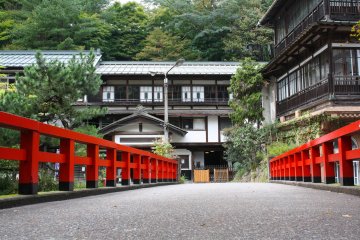Up in the high country of the Agatsuma District of Gunma Prefecture, at the end of the Shima Highway (四万街道) (National Highway 353), is Lake Okushima (奥四万湖), a lake formed following the construction of the Shimagawa Dam in 1999. Despite not being a naturally occurring lake, Lake Okushima is a beautiful example, like so many locations around Japan, of a place rising to meet the beauty of the natural world in which it is found. The road to get from the already remote Shima Onsen (四万温泉) to Lake Okushima is a twisting journey around the ridges, across the light and shade of the valleys and through tunnels bored into the mountains, taking you further and deeper into the forested highlands.
Being a reservoir for Shimagawa Dam, Lake Okushima is in the deep fold of the valley encased by imposing mountains ranges racing each other in parallel for the length of the lake and beyond. Nakanojo-machi (中之条町), Lake Okushima’s township, consists of 83% mountains and forests (being approximately 197 km²) and gives you a sense of the untouched quality of this part of Japan. You are not only far from civilization but far from the cares of the modern world.
In keeping with its uniqueness, for a reason that I couldn’t discover, the water of Lake Okushima is at the same time both the most outstanding blue-green colour and vibrantly transparent. I have subsequently found that the colour of the water varies between cobalt green and azure blue from day to day depending on the prevailing weather conditions. But when the result is this stunning, the reason no longer seems to matter and you spend more time soaking it in rather than wondering how it came to be. It’s also possible to walk across the Shimagawa Dam itself and look, on one side, across the glassy blue-green surface of Lake Okushima and, on the other, down the valley at the small townships nestled along the now harnessed Shima River.
If you want to get further off the beaten track and into deeper country, during the warmer seasons, there is a hiking trail that is opened that leads around the far edge of the lake and through the surrounding mountains. Though, as a word of advice and caution, be aware (but not alarmed) that there are occasionally bears and/or monkeys in the area. On this particular day there was no such wildlife but, despite the cold weather and the path being closed, both by ropes and mountains of soft snow, an adventurous looking rugged elderly gentleman popped out of the surrounding trees and commented on the good weather as he trudged past complete with snowshoes and walking poles. If you would prefer a more restful experience, a public bath next to the lake is open from April to November (adults: ¥400 and children: ¥200).
Public transport to Lake Okushima is somewhat difficult and, while it is possible to reach nearby Nakanojo (中之条) by train, there is still a 25 minute journey by car (or private bus service) to Shima Onsen (四万温泉) and a further 10 to 15 minutes to Lake Okushima from there. Renting a car may be your best option. The journey there may be complicated but the simple peace of mind, fresh air and freedom of spirit to be found is worth it.
Date visited: 28 December 2014











